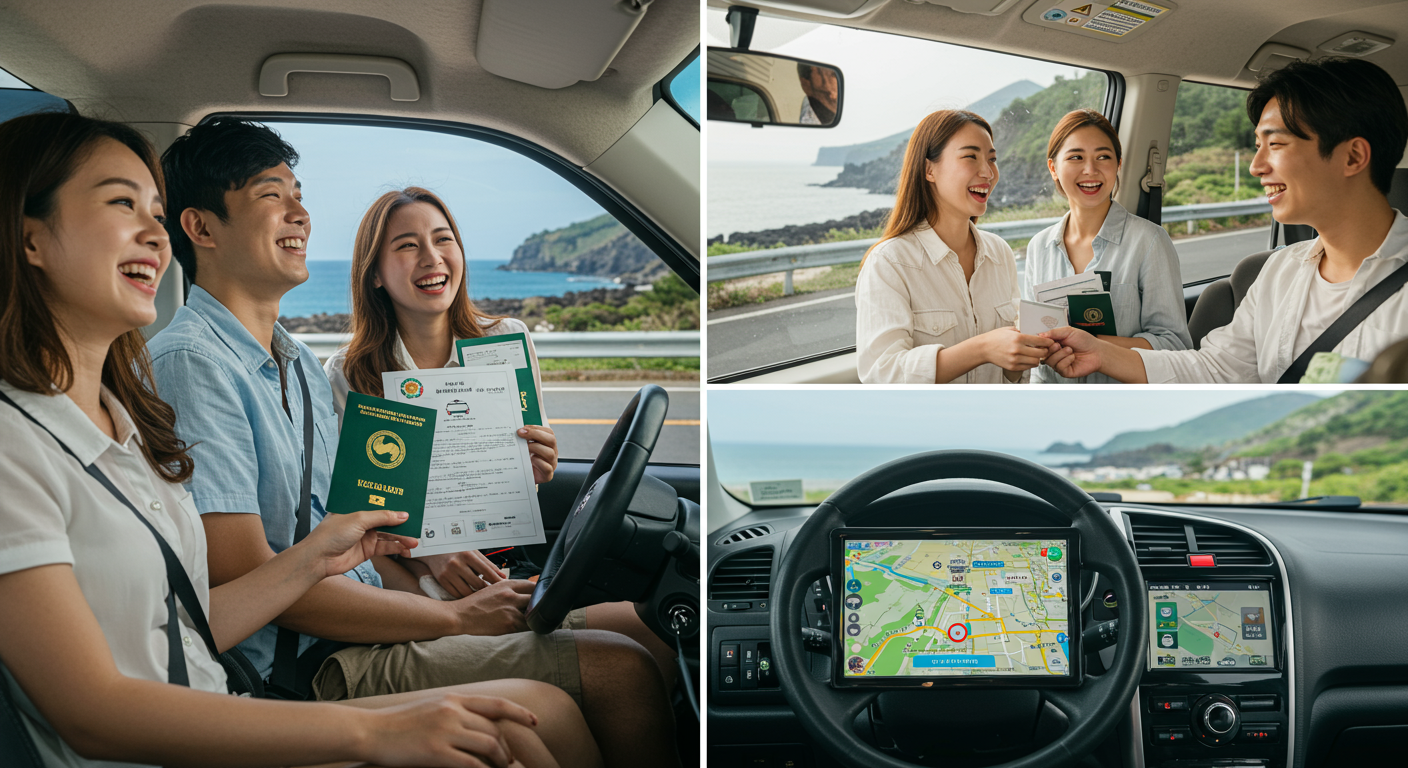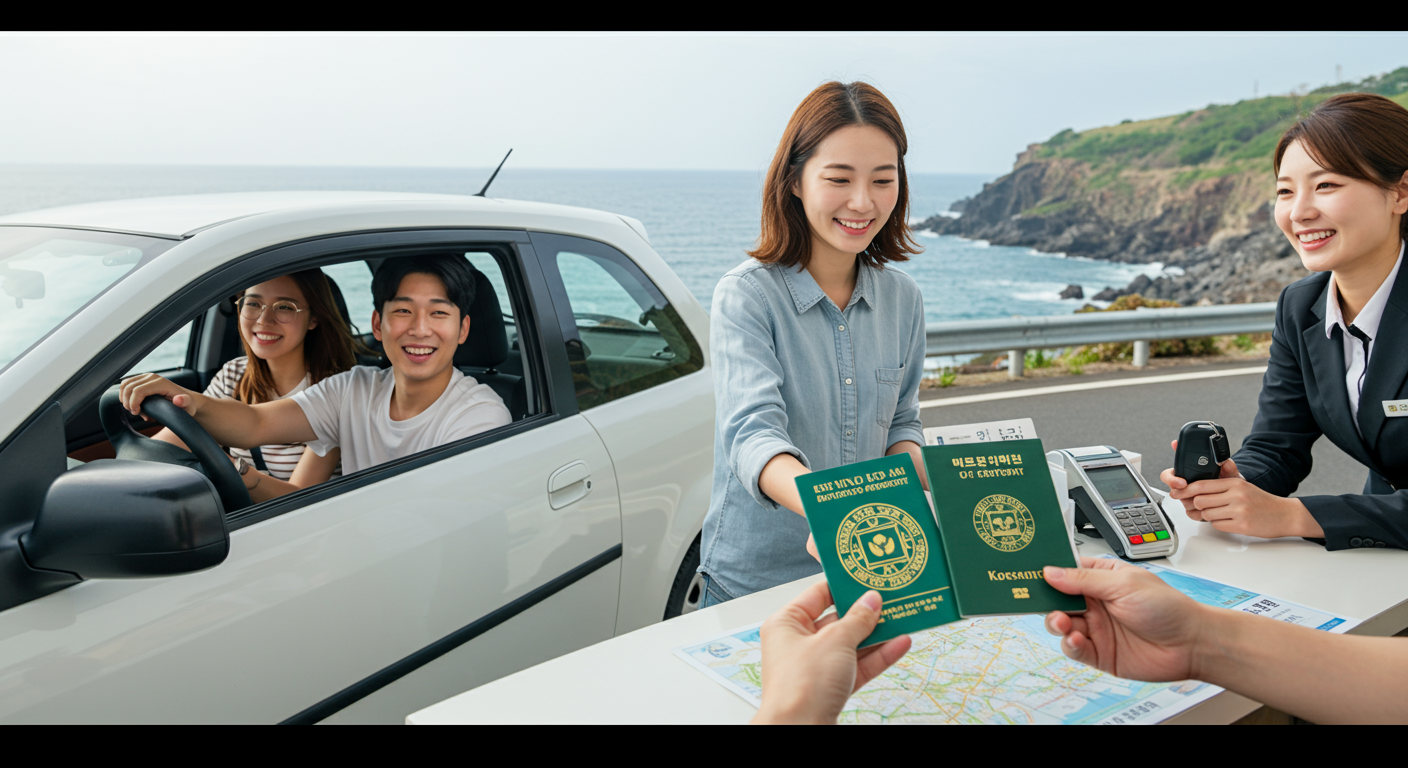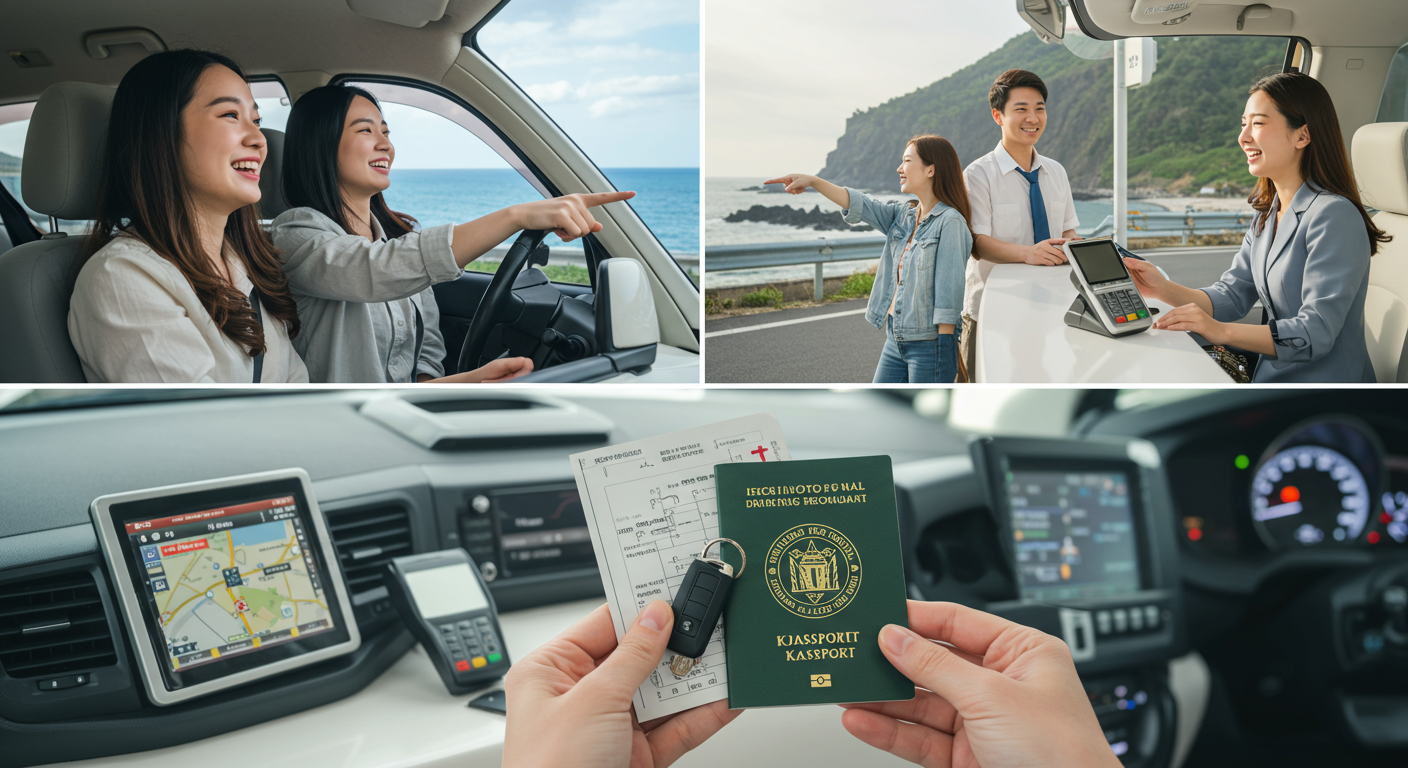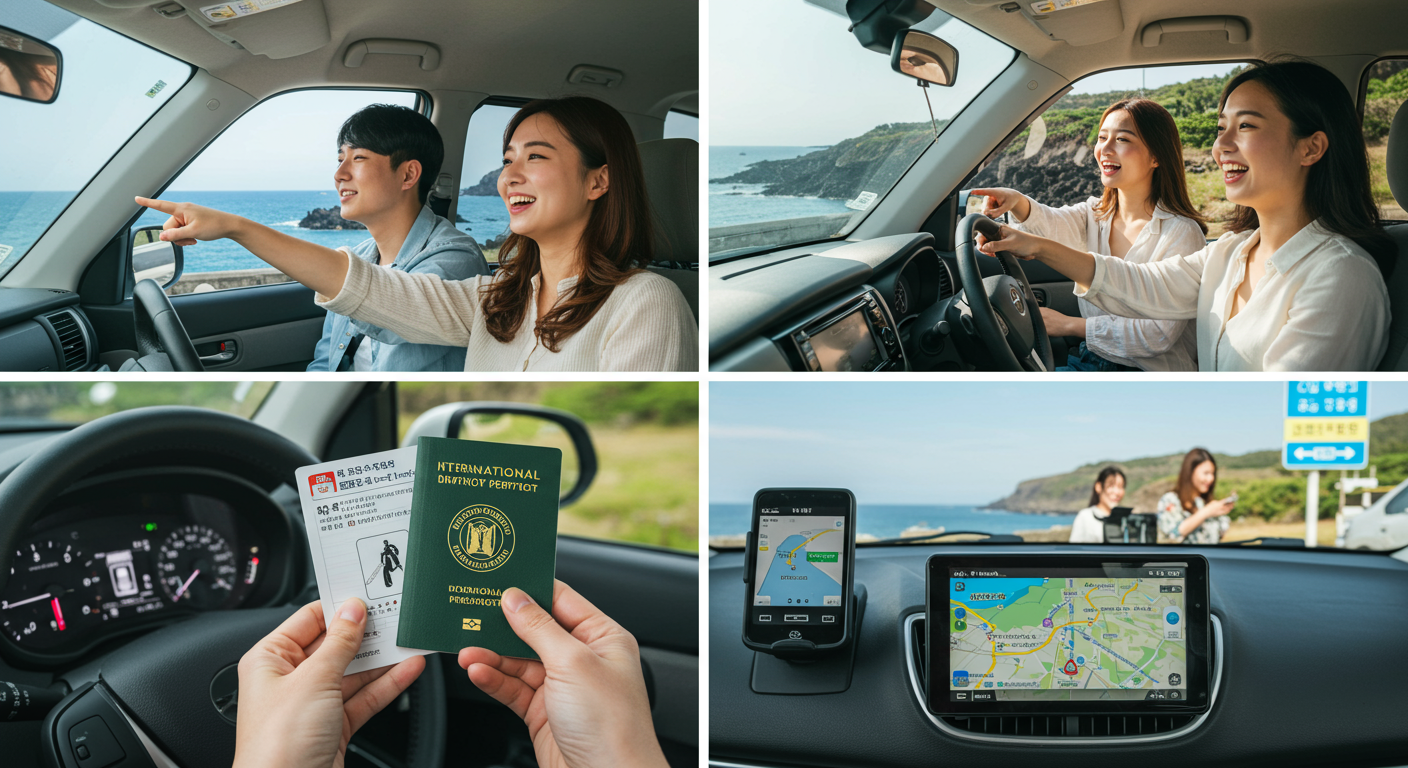Your Ultimate Guide to Renting a Car on Jeju Island, South Korea
Your Ultimate Guide to Renting a Car on Jeju Island, South Korea
Ever dreamed of exploring Jeju Island's hidden gems at your own pace, without being tied to bus schedules or expensive taxis?
I know that feeling of wanting total freedom on vacation. And let me tell you, when it comes to Jeju Island, renting a car is hands down the best way to experience everything this stunning island has to offer. But perhaps you're wondering, "Is driving in South Korea complicated? What about renting a car as a foreigner?" Don't you worry! I've been there, done that, and I'm here to share everything you need to know to make your Jeju car rental experience smooth sailing. Let's dive in.
Table of Contents
Why a Car Rental in Jeju is Your Best Bet
My first time in Jeju, I stubbornly tried to rely on public transportation. It was... an adventure, to say the least. While the bus system is decent for major routes, exploring Jeju's true magic requires a car. Imagine spontaneously pulling over at a breathtaking coastal viewpoint or stumbling upon a tiny, local café tucked away in a quiet village. That's the kind of freedom a rental car gives you! It's not just about convenience; it's about maximizing your precious vacation time and crafting your own unique itinerary, away from the typical tourist crowds. Plus, with family or lots of luggage, the comfort of your own wheels is simply unparalleled.
 Description: "A smiling young couple, aged late 20s, driving a small white rental car through a scenic coastal road on Jeju Island, with the ocean visible in the background. The mood is joyful and adventurous, captured in a realistic photo style."
Description: "A smiling young couple, aged late 20s, driving a small white rental car through a scenic coastal road on Jeju Island, with the ocean visible in the background. The mood is joyful and adventurous, captured in a realistic photo style."
Essential Requirements for Renting a Car in South Korea
Alright, let's get down to the nitty-gritty: what do you actually need to rent a car here? This is where many first-timers get tripped up, especially with the International Driving Permit. Make sure you have all these ducks in a row before you land on Jeju! Trust me, showing up without the right documents is a pain point you definitely want to avoid.
| Requirement | Details |
|---|---|
| International Driving Permit (IDP) | This is mandatory for all foreign drivers. You must obtain this in your home country before you arrive in South Korea. It must be valid and accompanied by your original domestic driver's license. |
| Passport | For identification purposes. |
| Original Driver's License | Your valid driving license from your home country. It must be the physical card, not a photocopy. |
| Credit Card | For the rental payment and a security deposit. Make sure it's in the main driver's name. |
| Age Requirement | Generally, drivers must be 21 years or older, with at least 1 year of driving experience. Some companies might require 23+ or even 26+ for certain vehicle types. |
 Description: "A close-up shot of a pair of hands, one holding an International Driving Permit and the other a Korean passport, placed on a car rental counter. The background is slightly blurred with rental car keys and a payment terminal. Realistic photo style, with a sense of official documentation."
Description: "A close-up shot of a pair of hands, one holding an International Driving Permit and the other a Korean passport, placed on a car rental counter. The background is slightly blurred with rental car keys and a payment terminal. Realistic photo style, with a sense of official documentation."
Your Step-by-Step Guide to Renting a Car on Jeju
Okay, so you've got your documents ready. Now, what's the actual process like once you're on Jeju? It's fairly straightforward, but knowing what to expect can save you a lot of hassle and time, which, let's be honest, is precious when you're on vacation! Follow these steps for a smooth pick-up.
- Book in Advance: Especially during peak season or holidays, cars can be scarce. Websites like Lotte Rent-a-Car, SK Rent-a-Car, or even local Korean rental sites like Tamra Rent-a-Car (use a translation tool if needed!) are your best bet. Booking a few weeks ahead, or even months, for popular times, is a smart move.
- Pick-up at Jeju Airport: After landing, follow the signs for "Rental Car Shuttle Bus." Jeju International Airport has a dedicated rental car complex a short shuttle ride away. These shuttle buses are frequent and easy to find, often right outside the arrivals gate.
- Vehicle Inspection – Be Thorough!: This is CRUCIAL. Before driving off, walk around the car with the rental staff. Take detailed photos or a video of ANY existing scratches, dents, or damage, no matter how small. Point them out to the staff to ensure they are noted on your rental agreement. This will save you from potential disputes when you return the car.
- Paperwork: Read your rental agreement carefully, especially the insurance terms (more on this below!) and fuel policy. Don't be afraid to ask questions if anything is unclear. Get a copy of everything for your records.
- Familiarize Yourself with the Car: Before hitting the road, take a moment to understand the car's basic functions: lights, wipers, horn, gear shift, and most importantly, the navigation system. Most rental cars in Korea have excellent Korean navigation systems (often Kakao Navi or T-Map) which can be set to English.
Navigating Jeju's Roads: Key Driving Rules & Tips
So you've got the keys in hand, now what? Driving in Jeju is generally pleasant; the roads are well-maintained, and traffic outside of Jeju City is usually quite manageable. But there are a few local quirks and rules that are good to know before you hit the open road.
- Speed Limits: These are strictly enforced, especially with abundant speed cameras. Urban areas are typically 30-50 km/h, while major roads and highways outside cities are generally 60-80 km/h. Keep an eye out for the digital speed signs; they really do mean business!
- U-Turns: This one always gets me! In Korea, you can only make U-turns at designated spots where a "U-Turn Zone" sign (or a blue arrow sign) is present, often at intersections with a traffic light. Don't just do it anywhere, unless you want a honk concert.
- Navigation Apps are Your Best Friend: Google Maps works, but it's not always the most accurate for driving in Korea. I swear by Kakao Navi or T-Map. These apps are specifically designed for Korean roads, often include real-time traffic updates, and can be set to English. Seriously, download one before you go!
- Parking: Look for designated parking areas. Many tourist spots and restaurants offer free parking, but in busier towns or near popular attractions, paid parking lots are common.
- Road Signs: Thankfully, most major road signs on Jeju are bilingual (Korean and English), which makes navigation a lot easier for international visitors.
 Description: "A dashboard view from a rental car on a sunny day in Jeju, showing a navigation app (like Kakao Navi or T-map) on the central screen with Korean text and a map of a scenic route. A hand is gently resting on the steering wheel, indicating a calm and guided journey. Photo realistic."
Description: "A dashboard view from a rental car on a sunny day in Jeju, showing a navigation app (like Kakao Navi or T-map) on the central screen with Korean text and a map of a scenic route. A hand is gently resting on the steering wheel, indicating a calm and guided journey. Photo realistic."
Understanding Insurance and Handling Accidents
This might be the least exciting part, but it's arguably the most important for peace of mind. Getting the right insurance can save you a huge headache (and a lot of money) if something unexpected happens. While driving in Jeju is generally safe, accidents can occur anywhere.
Collision Damage Waiver (CDW): Your Best Friend- Most rental companies offer different levels of CDW: Standard, Super, and Complete (or Premium).
- Standard CDW usually has a deductible, meaning you'll pay a certain amount out-of-pocket for damages.
- Super CDW typically covers most damages with no deductible, and it's what I personally always opt for. It's worth the slightly higher daily fee for the peace of mind.
- Complete/Premium CDW might offer even broader coverage, sometimes including single-car accidents or tire damage. Always check the specifics!
- Stay Calm & Ensure Safety: First and foremost, check for injuries. Move the car to a safe spot if possible and turn on your hazard lights.
- Call the Rental Company IMMEDIATELY: This is your first call, even before the police for minor incidents. They will guide you through the next steps and dispatch assistance if needed. Their number should be on your rental agreement.
- Call the Police (112): If there are serious injuries, significant damage, or if you're involved with another vehicle, call the police. They will issue a report, which is essential for insurance claims.
- Document Everything: Take photos and videos of the accident scene, damage to all vehicles involved, road conditions, and any relevant signs. Get contact information from other parties involved and witnesses.
- Do Not Admit Fault: Simply state the facts. Let the rental company and police handle the assessment of fault.
Returning Your Rental Car and Final Thoughts
Your Jeju adventure is winding down, and it’s time to return your trusty rental. The process is usually quick and efficient, but a few simple things can ensure a smooth handover and avoid any last-minute charges.
- Fuel Policy: Most rentals operate on a "full-to-full" policy. This means you pick up the car with a full tank and should return it with a full tank. There are plenty of gas stations around Jeju, especially near the airport, so fill up before you arrive at the rental return.
- Final Inspection: Rental staff will do a quick check of the car for new damages. This is where your photos/videos from pick-up come in handy if there's any dispute.
- Airport Drop-off: The rental car complex will have shuttle buses ready to take you back to the airport terminal, usually just a few minutes' ride. Allow a little extra time for this, especially if you have a flight to catch.
My personal advice? Always, always, always opt for the highest insurance cover. It’s a small extra cost for the immense peace of mind. And remember, renting a car truly unlocks Jeju's magic. It's a game-changer for your travel experience, allowing you to create those spontaneous, unforgettable memories.
 Description: "An aerial shot of a small, neat car rental return lot at Jeju International Airport, with several rental cars parked. In the foreground, a rental company employee is seen checking a car, with a traveler receiving keys in a realistic photo style. The atmosphere is efficient and final."
Description: "An aerial shot of a small, neat car rental return lot at Jeju International Airport, with several rental cars parked. In the foreground, a rental company employee is seen checking a car, with a traveler receiving keys in a realistic photo style. The atmosphere is efficient and final."
Frequently Asked Questions About Jeju Car Rentals
Absolutely, yes! It is a legal requirement for foreigners to drive in South Korea. Make sure to obtain your IDP in your home country before your trip and carry it along with your original domestic driver's license.
Not really! Jeju's roads are well-maintained and clearly signposted (often in both Korean and English). Traffic is generally lighter outside of Jeju City. The biggest tip is to use a local Korean navigation app like Kakao Navi or T-Map, which are incredibly accurate and user-friendly, even in English.
I strongly recommend opting for the "Super" or "Complete" Collision Damage Waiver (CDW). While it costs a bit more, it typically covers most damages without an excess/deductible, providing immense peace of mind throughout your trip. Always read the fine print of your chosen insurance plan.
Absolutely! Jeju Island is a hub for electric vehicles (EVs) due to its eco-friendly initiatives. Many rental companies offer a wide range of EV models, and charging stations are abundant across the island. Renting an EV can be a fantastic and unique experience for exploring Jeju.
© 2024 Your Blog Name. All rights reserved.
Comments
Post a Comment